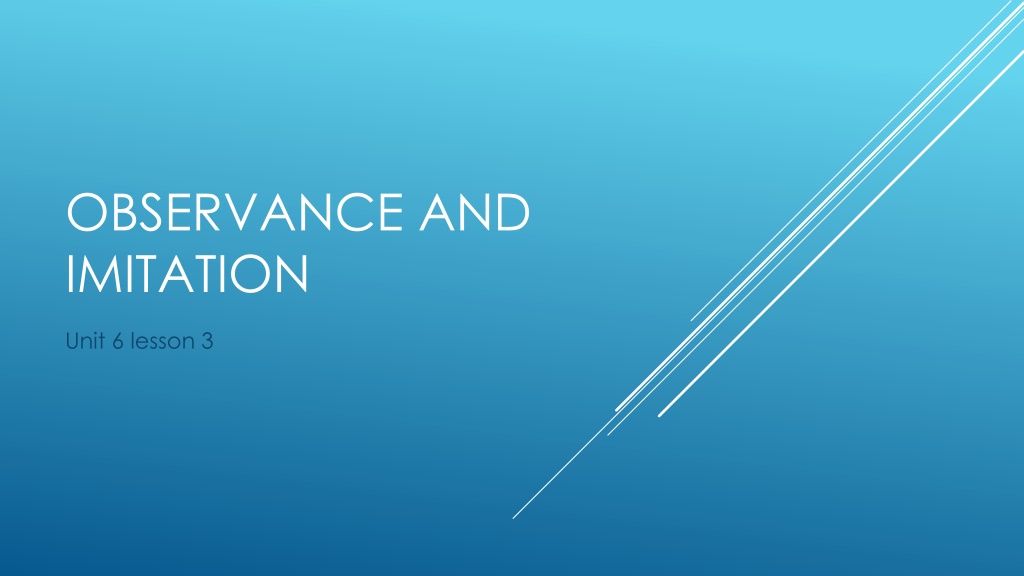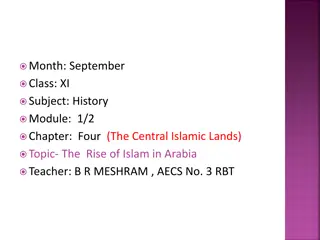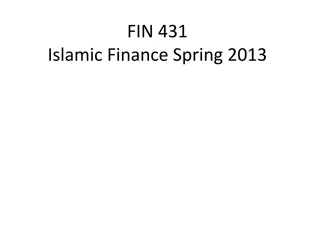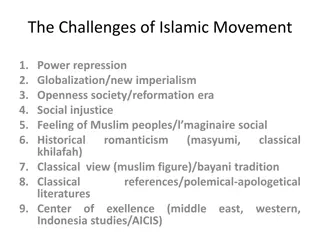Observance and Imitation in Islamic Teachings
The concepts of observance and imitation in Unit 6, Lesson 3, focusing on following the Prophet (PBUH) as an example, differentiating between observance and innovation, and understanding various sources of legislation and observance in Islamic teachings.
Download Presentation

Please find below an Image/Link to download the presentation.
The content on the website is provided AS IS for your information and personal use only. It may not be sold, licensed, or shared on other websites without obtaining consent from the author.If you encounter any issues during the download, it is possible that the publisher has removed the file from their server.
You are allowed to download the files provided on this website for personal or commercial use, subject to the condition that they are used lawfully. All files are the property of their respective owners.
The content on the website is provided AS IS for your information and personal use only. It may not be sold, licensed, or shared on other websites without obtaining consent from the author.
E N D
Presentation Transcript
OBSERVANCE AND IMITATION Unit 6 lesson 3
Learning objectives EXPLAIN THE MEANING OF OBSERVANCE AND IMITATION. DISCOVER THE OUTCOME OF IMITATION AS REGARDS SOCIETY. THE TWO TYPES OF IMITATION IN RULINGS. MAKE SURE OF ADHERING TO SOUND SCIENTIFIC THINKING.
The mission of all prophets consisted in following what is right after thorough thinking and, therefore, this mission had been characterized by clarity and transparency. Allah commanded His Messenger Muhammad (PBUH ) to explain to the people what has been revealed to him. The Companions ( ) used to ask the Prophet (PBUH )many questions to verify what was 'right and do it with awareness and perception. expect: Other reasons for the questions of the Companions addressed to the Prophet(PBUH) Science And Knowledge, The Right Understanding Of Religion
discuss: The following statement: "The question is half the answer". The question is the key to knowledge The concept of observance Observance denotes taking the Prophet (PBUH)as an example to be emulated and following his confirmed Sunnah. Observance aslo means following scholars and the way they interpret the Qur'an and Sunnah. In both meanings observance is to be based on evidence and arguments.
draw a comparison: between the following in the table below in terms of difference: Observance following the guidance of Prophet(PBUH) Innovation in its modern meaning is "a new idea, creative thoughts, new imaginations Creativity is a phenomenon whereby something new and somehow valuable is formed.
Other sources of legislation and observance The Qur'an and Sunnah are the first and second sources of legislation; but there are other sources like ijma' (consensus), qiyas (analogical reason) and others. All these sources are confirmed by Sharia evidence as demonstrated in the lesson on sources of Islamic Sharia. Acting according to the findings reached by these sources is observance especially that theologists have built their rulings on the basis of these sources in conformance to scientific and methodological controls free of fanciful pursuits and personal interests. Studying the evidence presented by these theologists is available to people.
Summarize the style of lfta' Official Center in answering the questions of callers, The method of wisdom, soft and good advice Identify the evidence on whose basis the Center issued the above fatwa. The sunnah and the sayings of the scholars in the Hadith
reflect and explain: the element of observance in the following : One of Omar's wives used to witness the dawn and night prayers in congregation in the mosque . People said to her "Why do you go out while you know that Omar dislikes this and feels jealous?' She said 'What stops him from preventing me?' They said the saying of Allah's Messenger(PBUH ), "Do not prevent your women from attending the mosque" (Narrated by Al Bukhari1 FOLLOW THE WORDS OF PROPHET(PBUH)
reflect and answer on the basis of this verse and according to the table below: "When they do anything that is shameful, they say: "We found our fathers doing so"; and "(Allah) commanded us thus": Say: "Nay, Allah never commands what is shameful: do you say of Allah what you know not?"(Sarat Al-'A'raj: 28) The worst kind of imitation referred to in the verse Blind imitation Explain: indulging in shameful acts contradicts the mind and religion Because Allah has forbidden adultery because it is contrary to religion.
The concept of imitation: Imitation means that the imitator accepts the views of others without verification or backing up evidence; the origin of imitation is fanaticism ,ignorance and fancifulness. Hazards associated with imitation: Fanaticism and egocentricity: Both these stir disputes and divisiveness between people leading to leveling charges against others and finding faults with them: this may amount to takfir (accusation of apostasy) and eventually to diffusion of of animosity amongst people. Refusal to accept what is right some imitators believe that whatever opposes their stance is false even if it is a correct hadith of Allah's Messenger(PBUH). Intellectual rigidity: Imitation robs intellectual activity of striving to keep abreast of the spirit of the age and finding solutions suitable to the renewable conditions of life in every age.
Organize my concept: Observance and imitation Observance Follow the guidance of Prophet(PBUH) The goodness of individual and society and distance from disagreement An imitators accepts what another says 1:imitation is permissible, is followed by guidance 2:A Muslim believes that he should follow a doctrine 1:intolerance Its importance Imitation The two types of imitation in rulings Some hazards of imitation























